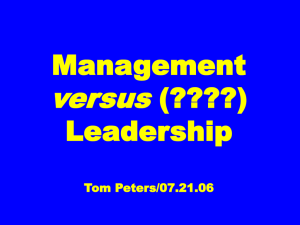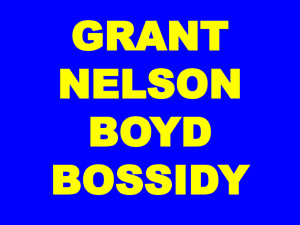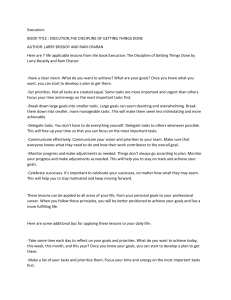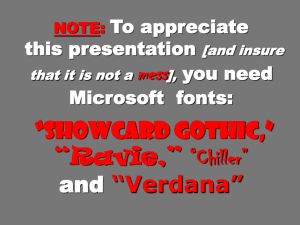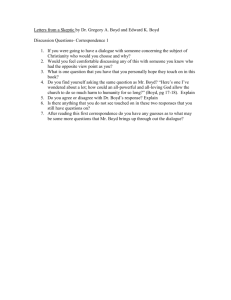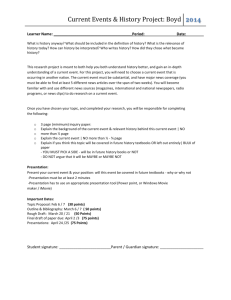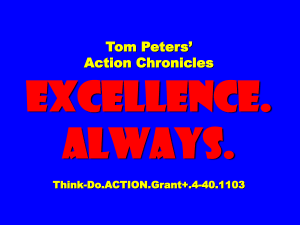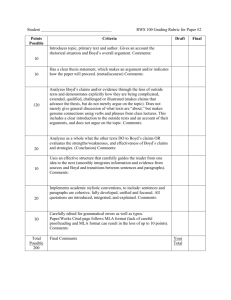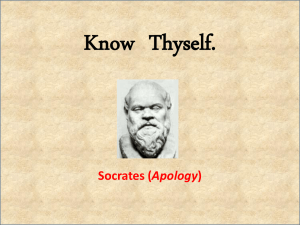Issue Y2K The Great War for Talent!
advertisement
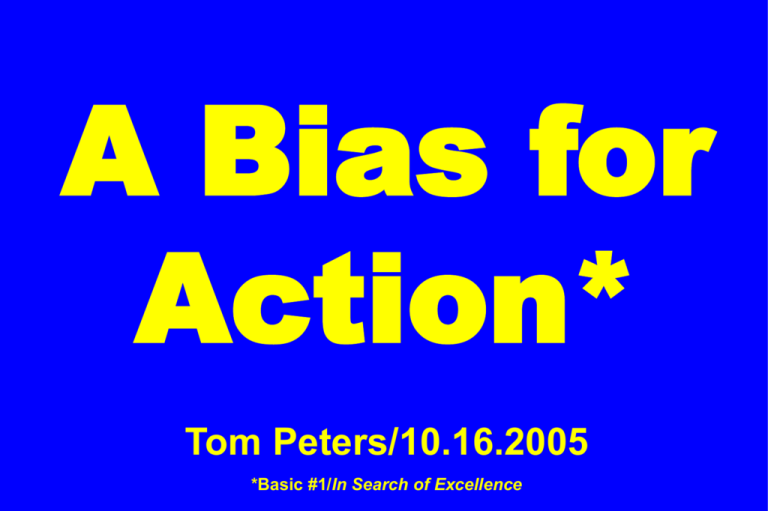
A Bias for Action* Tom Peters/10.16.2005 *Basic #1/In Search of Excellence “We have a ‘strategic’ plan. It’s called doing things.” — Herb Kelleher Frank Purdue (“You damn well better be right.” ) Herb Kelleher (“We have a ‘strategic plan,’ it’s called doing things.”) Roger Milliken (Action item/Milestone/Due date/Accountability/Consequences fanaticism) Bob Nardelli (Bulldog!) (7am!) Andy Pearson (the “missing 95 percent”/Op reviews/Deep dive) Bill Creech (Billboards/ “fly bys”/Squadron-spirit) Sam (Secret #1) Lee Scott (96-hour re-merchandising) (TP/CGA: “You’re problem isn’t that they’re bigger; it’s that they’re better.” ) Sam’s Secret #1! Michael Dell (NMNBS) Fred Smith (NMNBS) Earl Weaver Jerry Rice Roger Enrico (Rule of 3) (Leadership development) Pat Carrigan (5 X 25 = 125 years) Dennis Littky (LBI) Dick Anderson (Build it!) vs Dan (Report it—“tangible”/ “palpable”) (“Can Do!”) (WWII—working stiffs) George Patton (“A good plan executed right now tops a perfect plan executed next week.”) Horatio Nelson! John Boyd! (O.O.D.A. Loops) (Disorientation! Fly into the ground.) Dennis Diflorio (Commerce Bank; 7-7-7) The Nelson Baker’s Dozen 1. SIMPLE-CLEAR SCHEME (“PLAN”) (NOT WILDLY IMAGINATIVE) (Patton: “A good plan executed with vigor right now tops a ‘perfect’ plan executed next week.”) 2. Soaring/bold/clear/unequivocal/worthy/noble/inspiring “Goal”/“mission”/“purpose”/“quest” 3. “Conversation”: ENGAGEMENT OF ALL LEADERS 4. LEEWAY FOR LEADERS: Select the Best/Dip Deep/Initiative demanded/ Accountability swift/Micromanagement absent 5. Led by “LOVE” (Lambert), not “AUTHORITY” (IDENTIFY WITH SAILORS!) 6. INSTINCT/SEIZE THE MOMENT/“IMPETUOSITY” (Boyd’s “OODA Loops”: React more quickly than opponent, destroy his “world view”) 7. VIGOR! (Zander: leader as “Dispenser of Enthusiasm”) 8. Peerless Basic Skills/Mastery of Craft (Seamanship) 9. Workaholic! (“Duty” first, second, and third) 10. LEAD BY CONFIDENT & DETERMINED & CONTINUOUS & VISIBLE EXAMPLE (In Harm’s Way) (Gandhi: “You must be the change you wish to see in the world”/ Giuliani: Show up!) 11. Genius (“Transform the world to conform to their ideas,” “Triumph over rules”) (Gandhi, Lee-Singapore) , not Greatness (“Make the most of their world”) 12. Luck! (Right time, right place; survivor) (“Lucky Eagle” vs “Bold Eagle”) 13. Others principal shortcoming: “ADMIRALS MORE FRIGHTENED OF LOSING THAN ANXIOUS TO WIN” Source: Andrew Lambert, Nelson: Britannia’s God of War “Maneuverists” BOYD: The Fighter Pilot Who Changed the Art of War (Robert Coram) He who has the quickest O.O.D.A. Loops* wins! *Observe. Orient. Decide. Act. / Col. John Boyd OODA Loop/Boyd Cycle “Unraveling the competition”/ Quick Transients/ Quick Tempo (NOT JUST SPEED!)/ Agility/ “So quick it is disconcerting” (adversary over-reacts or under-reacts)/ “Winners used tactics that caused the enemy to unravel before the fight” (NEVER HEAD TO HEAD) BOYD: The Fighter Pilot Who Changed the Art of War (Robert Coram) “Blitzkrieg is far more than lightning thrusts that most people think of when they hear the term; rather it was all about high operational tempo and the rapid exploitation of opportunity.” / “Arrange the mind of the enemy”—T.E. Lawrence/“Float like a butterfly, sting like a bee”—Ali BOYD: The Fighter Pilot Who Changed the Art of War (Robert Coram) F86 vs. MiG/Korea/10:1 Bubble canopy (360 degree view) Full hydraulic controls (“The F86 driver could go from one maneuver to another faster than the MiG driver”) MiG: “faster in raw acceleration and F86: “quicker in changing maneuvers” turning ability.” BOYD: The Fighter Pilot Who Changed the Art of War (Robert Coram) “It is not the strongest of the species that survives, nor the most intelligent, but the one most responsive to change.” —Charles Darwin “To Be somebody or to Do something” BOYD: The Fighter Pilot Who Changed the Art of War (Robert Coram) “If your boss demands loyalty, give him integrity. But if he demands integrity, give him loyalty.” —BOYD: The Fighter Pilot Who Changed the Art of War (Robert Coram) Peter Lewis (“We sell speed.”) Dick Brown (“intense candor”) Meg Whitman (“Strategy meetings two times a week”) Mark McCormack (5,000mil-5min) Richard Haass (“I used to have a rule for myself that at any point in time I wanted to have in mind — as it so happens, also in writing, on a little card I carried around with me—the three big things I was trying to get done. Three. Not two. Not four. Not five. Not ten. Three.”) (SIO) John Masters (You must drill.) Nobel/Medicine (They ground up more pig brains!) 5,000 miles for a 5 min. meeting! Mark McCormack: John Masters: “This is so simple it sounds stupid, but it is amazing how few oil people really you only find oil if you drill wells. You may think you’re understand that finding it when you’re drawing maps and studying logs, but you have to drill.” (Canadian Hunter) Wilf Corrigan (LSI … “and then we’d send him to Taipei …”) Dennis Donovan ($21M) Guy Kawasaki (25 X 4 = 100 per year) Nathan Myrvold (10,000X) Ed Michaels ($25M-$80M/2 yrs) Oticon (“scoreboard” in the lunchroom) GE (1 of 100) 3M HP (old) “1, 2, 3 … Bullshit” Re-do Rapidly (Microsoft) Norio Ogha (Fast prototyping/IDEO/ MSchrage: Prototyping = #1) “If Microsoft is good at anything, it’s avoiding the trap of worrying about criticism. Microsoft fails constantly. They’re eviscerated in public for lousy products. Yet they persist, through version after version, until they get something good enough. Then they leverage the power they’ve gained in other markets to enforce their standard.” Seth Godin, Zooming “Fail faster. Succeed sooner.” David Kelley/IDEO Fail. Forward. Fast. –High-tech Exec Larry Bossidy (CANDOR!) (Promises made & kept. Consequences.) LB (Ex as Core Competence #1 All key systems designed around Execution) LB (religion of “action items”) Larry Bossidy & Ram Charan/Execution: The Discipline of Getting Things Done “I saw that leaders placed too much emphasis on what some call highlevel strategy, on intellectualizing and philosophizing, and not enough on implementation. People would agree on a project or initiative, and then nothing would come of it.” —Larry Bossidy & Ram Charan/ Execution: The Discipline of Getting Things Done “Execution is a systematic process of rigorously discussing hows and whats, tenaciously following through, and ensuring accountability.” —Larry Bossidy & Ram Charan/ Execution: The Discipline of Getting Things Done “Execution is the job of the business leader.” —Larry Bossidy & Ram Charan/ Execution: The Discipline of Getting Things Done (“Leaders ‘do’ people. Period.” ) —TP The Leader’s Seven Essential Behaviors *Know your people and your business *Insist on realism *Set clear goals and priorities *Follow through *Reward the doers *Expand people’s capabilities *Know yourself Source: Larry Bossidy & Ram Charan/ Execution: The Discipline of Getting Things Done “Realism is the heart of execution.” —Larry Bossidy & Ram Charan/ Execution: The Discipline of Getting Things Done “robust dialogue” —Larry Bossidy & Ram Charan/ Execution: The Discipline of Getting Things Done “The person who is a little less conceptual but is absolutely determined to succeed will usually find the right people and get them together to achieve objectives. I’m not knocking education or looking for dumb people. But if you have to choose between someone with a staggering IQ and an elite education who’s gliding along, and someone with a lower IQ but who is absolutely determined to succeed, you’ll always do better with the second person.” —Larry Bossidy (Larry Bossidy & Ram Charan/ Execution: The Discipline of Getting Things Done) Duct Tape Rules! “Andrew Higgins, who built landing craft in WWII, refused to hire graduates of engineering schools. He believed that they only teach you what you can’t do in engineering school. He started off with 20 employees, and by the middle of the war had 30,000 working for him. He turned out 20,000 landing craft. D.D. Eisenhower told me, ‘Andrew Higgins won the war for us. He did it without engineers.’ ” —Stephen Ambrose/Fast Company Ye gads: “Thomas Stanley has not only found no correlation between success in school and an ability to accumulate wealth, he’s actually found a negative correlation. ‘It seems that school-related evaluations are poor predictors of economic success,’ Stanley concluded. What did predict success was a willingness to take risks. Yet the success-failure standards of most schools penalized risk takers. Most educational systems reward those who play it safe. As a result, those who do well in school find it hard to take risks later on.” Richard Farson & Ralph Keyes, Whoever Makes the Most Mistakes Wins RHWjr-TP (#1: Bias for Action) (#1 = MBWA!) (ISOE-Daniel; “Managing Our Way to Economic Decline”/HBR) (XX) TP (1st GSB dissertation on Implementation) (B>A vs A>B) TP (My lucky breaks: Dan, Xerox) TP (35 years: Decentralization. Accountability.) TP (MTD—Master of Talent Development; W/MwGTDw/oC— Woman/Man Who Gets Things Done without Certificate; MMM—Master of Metabolic Management; DE—Doctor of Enthusiasm) Importance of Success Factors by Various“Gurus”/ Estimates (Unreliable) by Tom Peters Strategy Systems Passion Execution Porter 50% 20 15 15 Drucker 35% 30 15 20 Bennis 25% 20 30 25 Peters 15% 25 25 35 “too much talk, too little do” TP on BigCo sin #1: Importance of Success Factors by Various“Gurus”/ Estimates (Unreliable) by Tom Peters Strategy Systems People Passion Porter 50% 20 20 10 Drucker 30% 35 20 15 Bennis 25% 20 30 25 Peters 15% 20 35 30 600,000/engineering degrees/2004/China 350,000/engineering degrees/2004/India 70,000/engineering degrees/2004/U.S.A. Source: “Rising Above the Gathering Storm”/ National Academies of Science/Presidential report/October 2005 MBWA “The first and greatest imperative of command is to be present in person. Those who impose risk must be seen to share it.” —John Keegan, The Mask of Command A man approached JP Morgan, held up an envelope, and said, “Sir, in my hand I hold a guaranteed formula for success, which I will gladly sell you for $25,000.” “Sir,” JP Morgan replied, “I do not know what is in the envelope, however if you show me, and I like it, I give you my word as a gentleman that I will pay you what you ask.” The man agreed to the terms, and handed over the envelope. JP Morgan opened it, and extracted a single sheet of paper. He gave it one look, a mere glance, then handed the piece of paper back to the gent. And paid him the agreed-upon $25,000 … 1. Every morning, write a list of the things that need to be done that day. 2. Do them. Source: Hugh MacLeod/tompeters.com/NPR Do them! “In classical times when Cicero had finished speaking, the people said, ‘How well he spoke,’ but when Demosthenes had finished speaking, they said, us march.’” ‘Let —Adlai Stevenson Let us march “I don’t know if ‘it’ is possible.’ I do know it’s ‘necessary.’” TP/Chile:
